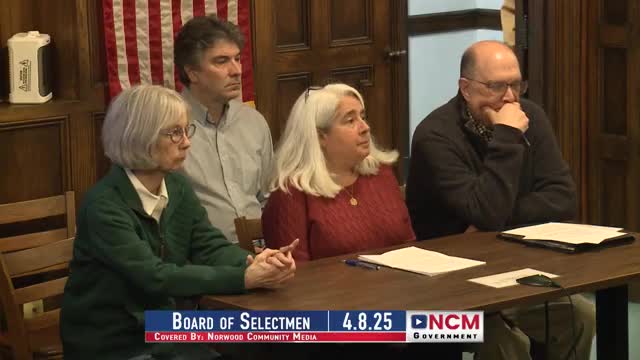Norwood finance commission urges split of large free‑cash windfall: special-education reserve, capital and pension funds proposed
Get AI-powered insights, summaries, and transcripts
Subscribe
Summary
Norwood’s Finance Commission recommended allocating a large certified free‑cash balance to a mix of reserves and capital — including up to $880,959 for special‑education stabilization, additions to a compensated‑absences reserve and creation of capital and pension reserve funds — and urged a town‑wide policy approach to one‑time funds.
At a combined presentation to the selectmen on April 8, Norwood’s Finance Commission asked the board to add several articles to the upcoming special and annual town meeting warrants to allocate a substantial certified free‑cash balance.
FinCom chair Maya Bodenhofer said the town had “an unprecedented amount of free cash” and proposed measures to protect the town’s financial position over coming years. The commission recommended: (1) contributing up to $880,959 to the Special Education Stabilization Fund (bringing it to the statutory 2% cap on net school spending), (2) additional allocations to the compensated‑absences reserve (the fund balance is roughly $2,000,000 and the typical annual payout is about $400,000), (3) creation of a capital reserve fund to set aside money for building roofs and other deferred maintenance, and (4) consideration of a pension reserve fund to offset volatility in the town’s required pension contributions.
On special education, school finance staff explained that state law permits a stabilization balance up to 2% of net school spending; that cap works out to $1,580,959 for FY24, and the district could add roughly $880,959 to reach the cap after accounting for the current balance and near‑term budget plans. The schools’ presenters said special education placements can produce sudden multi‑hundred‑thousand‑dollar tuition costs and that an adequately funded stabilization account smooths budgeting for the volatile out‑of‑district tuition line.
On compensated absences, finance staff and FinCom members described the account as a long‑term liability reserve that pays accrued vacation and sick payouts at employee separation. They said the balance is about $2 million and suggested modest annual additions (one figure discussed was $250,000) until the fund covers a larger share of the estimated liability (the town’s accrued compensated‑absences liability is roughly $4.1 million on the books).
FinCom stressed the need for a townwide policy discussion about the use of a one‑time windfall: in the scenario the commission described, roughly half of the available funds would be proposed for capital projects, about 25% would be used to shore up the FY26 operating budget and the remainder rolled into reserves for future years. Several selectmen and the town manager said they supported the idea of a measured plan and asked FinCom to convene broader town and school stakeholders to produce clear financial‑policy thresholds for future allocations.
Why it matters: The commission’s proposal would reallocate one‑time free cash into multi‑year reserves and capital funding, with the goal of reducing budget volatility and supporting long‑term asset protection.
What’s next: FinCom asked the selectmen to place the articles on the warrant; the board agreed to continue detailed deliberations and to schedule follow‑up sessions with staff, the school committee and FinCom before the warrant is finalized.
